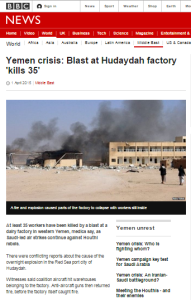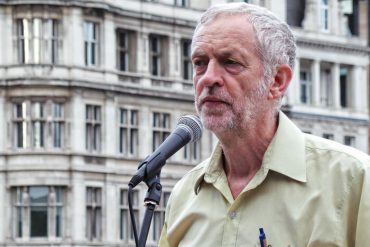As readers no doubt recall, within twenty-four hours of the commencement of Operation Protective Edge in July 2014, the BBC had begun promoting the theme of ‘Israeli war crimes’. In the first week of the conflict, BBC audiences were also told that Israel deliberately targeted civilians and heard claims of ‘collective punishment’ and a ‘disproportionate’ Israeli response to the actions of terrorist organisations in the Gaza Strip. Throughout the BBC’s coverage of the seven week-long hostilities, the topic of civilian casualties was by far the most prominent with thousands of words and hours of air-time devoted to emotive reporting of the plight of civilians in the Gaza Strip and Hamas-supplied casualty figures quoted unquestioningly.
Six days after the commencement of airstrikes on Yemen on March 26th by the Saudi Arabian-led coalition, the UN estimated that almost a hundred civilians had been killed and some 364 injured. The actual figure can be reasonably assumed to be higher by now.
The BBC has to date refrained from ‘parachuting in’ to Yemen star reporters such as Lyse Doucet and Jeremy Bowen as it did during last summer’s conflict in Israel and the Gaza Strip and it is interesting to ponder the question of whether the corporation’s reporting on civilian casualties in Yemen is affected by that fact.
In an article titled “Saudi Arabia launches air strikes in Yemen” published on the BBC News website on March 26th readers were informed that:
“A civil defence source told the AFP news agency that 13 civilians were killed when seven homes near the al-Dulaimi air base were destroyed. The Houthis’ al-Masirah TV quoted the health ministry as putting the death toll at 18.”
The BBC refrained from making any pronunciations with regard to the legality of the airstrikes or their ‘proportionality’. Likewise, no accompanying claims of ‘deliberate targeting of civilians’ appeared in the BBC’s March 28th article titled “Yemen crisis: Saudis lead fresh air strikes on Houthis” which informed readers that:
“Since the air campaign began, at least 39 civilians – including six children under the age of 10 – have been killed, Yemen health ministry officials say.”
An article titled “Yemen crisis: Dozens killed by ‘air strike’ near refugee camp” published on March 30th was guarded in its presentation of information not independently verified by the BBC.
“An air strike has killed at least 40 people at a refugee camp in northwest Yemen, aid workers have said.
State media said Saudi planes were responsible, but the Yemeni foreign minister said “artillery strikes” by Houthi rebels were to blame.”
An article published on April 1st under the title “Yemen crisis: Blast at Hudaydah factory ‘kills 35’” also presented the story in cautious language, acknowledging that the causes of incidents are not always immediately clear.
“At least 35 workers have been killed by a blast at a dairy factory in western Yemen, medics say, as Saudi-led air strikes continue against Houthi rebels.
There were conflicting reports about the cause of the overnight explosion in the Red Sea port city of Hudaydah.
Witnesses said coalition aircraft hit warehouses belonging to the factory. Anti-aircraft guns then returned fire, before the factory itself caught fire.
The UN has expressed alarm at the rising number of civilian casualties.”
The article also states:
“The Saudi-led coalition also bombarded Houthi positions in Aden overnight. A military official told the AFP news agency that there were “many dead and wounded”.
The coalition has insisted that it is trying to avoid killing civilians.
“Collateral damage can happen… but I confirm to you that the coalition takes all care,” spokesman Brigadier General Ahmed Asiri was quoted as saying by AFP.
But on Tuesday Amnesty International accused Saudi Arabia and its allies of “turning a blind eye to civilian deaths”, and the UN Children’s Fund (Unicef) reported that at least 62 children had been killed and 30 hurt over the past week.”
Jeremy Bowen was not on hand to inform the world that Saudi Arabia “has serious questions to answer”.
An additional article from April 1st – “Yemen crisis: Where does Saudi offensive go next?” by Frank Gardener – is equally cautious in attributing responsibility:
“At least 35 civilians were killed on Tuesday night in an attack on a dairy factory suspected of being used by rebels as a weapons cache, although the cause of the deaths was unclear.”
An April 2nd report titled “Yemen crisis: Fighting intensifies in Aden” has a subsection headed “Civilian deaths” which states:
“As the fighting continues, concern over casualties has risen.
A spokeswoman for the aid agency Medecins Sans Frontieres (MSF) told the BBC that its hospital in Aden had received more than 500 injured people from all sides in the conflict over the last two weeks.
Coalition spokesman, Gen Ahmed Asir, told the BBC’s Frank Gardner in Riyadh that “it was a hard task to target” the rebels.
The coalition was “using all intelligence resources to make sure they are not hitting the wrong target. We do not hit any target without making sure it is a Houthi or troops loyal to former President Saleh,” he said.
The UN has also expressed alarm at the rising number of civilian deaths in Yemen.”
So what caused BBC reporting on civilian casualties in the first week of conflict in Yemen to be so different from its reporting on the first week of last summer’s conflict in Israel and the Gaza Strip and why are audiences not reading or hearing the same amateur opinions on ‘international law’ or accusations of war crimes, crimes against humanity, collective punishment and deliberate targeting of civilians?
The all too obvious answer to those questions is that in this case the BBC’s correspondents are not focused on promoting a pre-existing politically motivated narrative and amplifying unquestioned and unchallenged messaging from NGOs with a similar political world view to that held by visiting journalists. Instead, they are reporting the news.



